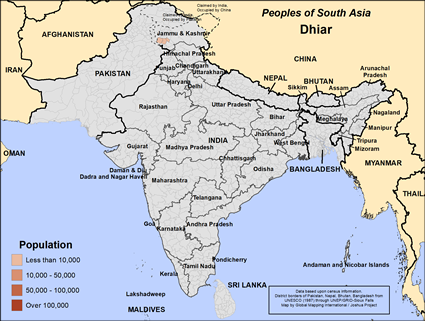Dhiar in India

Send Joshua Project a photo
of this people group. |

Map Source:
People Group data: Omid. Map geography: UNESCO / GMI. Map Design: Joshua Project
|
| People Name: | Dhiar |
| Country: | India |
| 10/40 Window: | Yes |
| Population: | 8,800 |
| World Population: | 8,800 |
| Primary Language: | Kashmiri |
| Primary Religion: | Hinduism |
| Christian Adherents: | 0.00 % |
| Evangelicals: | 0.00 % |
| Scripture: | Complete Bible |
| Ministry Resources: | Yes |
| Jesus Film: | Yes |
| Audio Recordings: | Yes |
| People Cluster: | South Asia Dalit - other |
| Affinity Bloc: | South Asian Peoples |
| Progress Level: |
|
Introduction / History
The Hindu Dhiar people have a long history in Kashmir, India, dating back several centuries. They have traditionally engaged in agriculture and artisanal crafts, contributing significantly to the local economy. The Dhiar people primarily speak Kashmiri, the local language.
What Are Their Lives Like?
The Hindu Dhiar people now live in rural villages in Kashmir, focusing on farming and traditional crafts. They cultivate crops such as rice, wheat, and saffron, and many families also engage in weaving and pottery. Their communities are close-knit, emphasizing strong family bonds and mutual support. The Dhiar maintain a vibrant cultural life with local festivals, music and traditional arts.
The Dhiar's diet is based on vegetarian food, including rice, lentils, vegetables and a variety of spices. They also enjoy traditional Kashmiri dishes like rogan Josh (meat dish), Dum Aloo (potato dish), and festive foods during celebrations. Their culinary practices emphasize simplicity, nutrition, and the use of locally available ingredients.
Their wedding practices are elaborate and deeply rooted in Hindu tradition. Weddings typically include Hindu rituals such as the exchange of garlands, sacred fire ceremonies, and vibrant music and dance performances.
What Are Their Beliefs?
The Hindu Dhiar people practice Hinduism, worshiping various deities and observing numerous religious rituals and festivals such as Diwali, Holi, and Navratri. Their belief system emphasizes values like dharma (duty), karma (actions and consequences), and ahimsa (non-violence). They honor their ancestors through rituals and ceremonies, ensuring the transmission of their religious and cultural traditions across generations.
What Are Their Needs?
The Hindu Dhiar people need better access to quality education to provide more opportunities for their children. Improved healthcare services are essential due to the limited availability of medical facilities and high rates of preventable diseases. Economic support through modern agricultural techniques, market access, and vocational training can enhance their livelihoods. Infrastructure development, including better roads, clean water supplies, and reliable electricity, will greatly benefit the Dhiar community.
Prayer Points
Pray for the Lord to protect the Dhiar people from insurgents.
Pray for a record crop this year as a testimony of God's power and goodness.
Pray for a Dhiar-based movement to Christ.
Pray for loving and dedicated workers to go to them no matter what the danger.